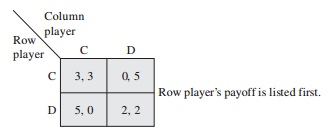Reference no: EM131250230
Consider the prisoners' dilemma stage game pictured here:

The following questions ask you to consider various discrete-time environments in which people meet and play the stage game. For each environment, you are to determine the extent to which cooperation can be sustained in a subgame perfect equilibrium.
(a) Suppose that two players interact in an infinitely repeated game, with the stage game shown, and that the players share the discount factor d ∈ (0, 1). Under what conditions on d is there a subgame perfect equilibrium that supports both players selecting C each period?
(b) Suppose that there is a society of k individuals. In each period, two people from the society are randomly selected to play the stage game. Individuals are equally likely to be selected. Furthermore, the random draw that determines who is selected in a given period is independent of the outcomes in previous periods. Thus, an individual has a probability 2>k of being selected to play the stage game in any given period. One of the people selected plays the role of Row player in the stage game, whereas the other person plays the role of Column player. (The stage game is symmetric, so the roles do not matter.) Those who are selected obtain the payoffs of the stage game, whereas the individuals who were not selected get 0 for this period. Everyone discounts the future using discount factor δ.
Assume that the individuals can identify each other. That is, individuals know the names and faces of everyone else in the society. Assume also that before the stage game is played in a given period, everyone observes who is selected to play. Further, everyone observes the outcome of each period's stage game. Is there a sense in which it is more difficult to sustain cooperation in this random-matching setting than was the case in part (a)? Explain why or why not. Calculate the cutoff value of d under which cooperation can be sustained.
(c) Consider the same setting as in part (b) except assume that the individuals only observe their own history of play. As before, individuals can identify each other. However, an individual only knows when he is selected to play the stage game; if he is not selected to play in a given period, he observes neither who was selected to play nor the outcome of the stage game. When an individual is selected to play the stage game, he learns whom he is matched with; then the stage game is played, and the two matched individuals observe the outcome. Explain why cooperation is more difficult to sustain in this setting than in the setting of part (b). If you can, calculate the cutoff value of d under which cooperation can be sustained.
|
Expatriate management at astrazeneca
: The week six assignment is to complete and discuss the case study: "Expatriate Management at AstraZeneca" (page 325)
|
|
Explain the inferences being made
: Explain the inferences being made, and do not simply give a book report of the premises and conclusions.
|
|
Total cost of their inventory for item
: 1. If they wish to minimize the total cost of their inventory for this item, how many should they order each time they place an order? 2. How many units should be left when they place their next order? 3. Assuming they buy the number of items you d..
|
|
Explain the methods that you will use to display the data
: Explain the data that you plan to collect. Explain the data analysis methods that you will use after you collect the data. Explain the methods that you will use to display the data.
|
|
Calculate the cutoff value of d
: Under what conditions on d is there a subgame perfect equilibrium that supports both players selecting C each period?
|
|
Concept of utilitarianism
: Was the greater good satisfied even though you broke the law and stole food? Was the concept of utilitarianism met? Should we even consider breaking the law to satisfy some other ethical theory?
|
|
Were any of the amendments violated
: Can you suggest an interrogation method or strategy that may have affected the outcome of the case? Explain. What would you have done differently? What safeguards would you implement to prevent wrongful convictions as the result of false confessions?
|
|
Law of demand applies to a recent purchase
: Analyze how the law of demand applies to a recent purchase that you made. Describe how the product has changed in price and explain whether the price change is due to supply or demand. Did the change in price affect your decision to purchase the i..
|
|
How the aforementioned constitutional amendments
: Utilizing a minimum of three sources, such as course readings as well as the additional readings, define and discuss the implications of each of the Fourth, Fifth, Sixth, and Fourteenth Amendments as well as the Miranda case law on executing inter..
|